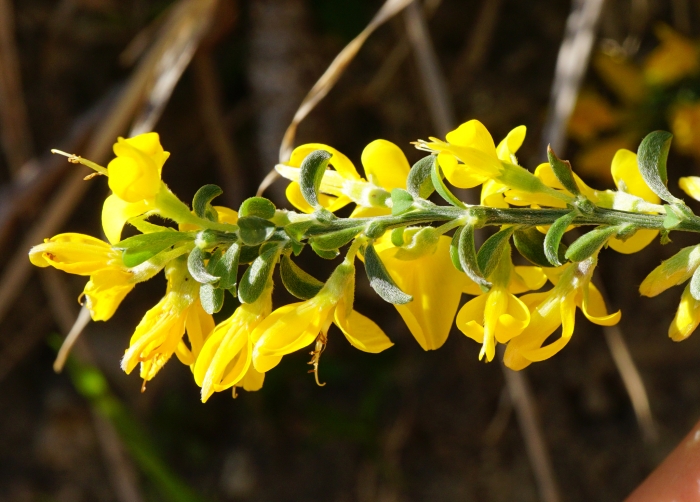Hairy Greenweed
(Genista pilosa)
Hairy Greenweed (Genista pilosa)
/
/

Patrick Hacker
CC BY 4.0
Image By:
Patrick Hacker
Recorded By:
Copyright:
CC BY 4.0
Copyright Notice:
Photo by: Patrick Hacker | License Type: CC BY 4.0 | License URL: http://creativecommons.org/licenses/by/4.0/ | Rights Holder: Patrick Hacker | Publisher: iNaturalist | Date Created: 2020-05-08T16:12:22-07:00 |














































Estimated Native Range
Summary
Genista pilosa, commonly known as Hairy Greenweed, is an evergreen shrub native to a variety of habitats including open woodlands, heathlands, and grassy clearings across Europe. It typically reaches a height of 2 feet (0.6 meters) and a width of 3 feet (0.9 meters). This plant forms a low, dense mound with slender, green stems covered in fine hairs, giving it a soft, hairy appearance. The bright yellow, pea-like flowers bloom profusely in late spring to early summer, creating a striking display against the small, green leaves.
Hairy Greenweed is valued for its drought tolerance and ability to thrive in poor soils, making it an excellent choice for rock gardens, slopes, and border fronts. It is also used to stabilize soil and prevent erosion. In cultivation, it requires full sun to maintain its compact form and prolific flowering. It is adaptable to a range of soil types, provided they have good drainage. While generally low-maintenance, it may be susceptible to fungal diseases in wet conditions. Pruning after flowering can help maintain its shape and promote new growth.CC BY-SA 4.0
Hairy Greenweed is valued for its drought tolerance and ability to thrive in poor soils, making it an excellent choice for rock gardens, slopes, and border fronts. It is also used to stabilize soil and prevent erosion. In cultivation, it requires full sun to maintain its compact form and prolific flowering. It is adaptable to a range of soil types, provided they have good drainage. While generally low-maintenance, it may be susceptible to fungal diseases in wet conditions. Pruning after flowering can help maintain its shape and promote new growth.CC BY-SA 4.0
Plant Description
- Plant Type: Shrub
- Height: 1-1.5 feet
- Width: 2-3 feet
- Growth Rate: Slow
- Flower Color: Yellow
- Flowering Season: Spring, Summer
- Leaf Retention: Evergreen
Growth Requirements
- Sun: Full Sun
- Water: Medium
- Drainage: Slow, Medium
Common Uses
Bank Stabilization, Bee Garden, Bird Garden, Border Plant, Butterfly Garden, Drought Tolerant, Fragrant, Groundcover, Hummingbird Garden, Low Maintenance, Rock Garden, Showy Flowers
Natural Habitat
Native to open woodlands, heathlands, and grassy clearings across Europe
Other Names
Common Names: Silkyleaf Woadwaxen, Creeping Broom, Silkyleaf Broom, Håret-Visse, Haar-Ginster, Behaarter Ginster, Genêt Velu, Kruipbrem, Drok Volosistyi, Hårginst
Scientific Names: , Genista pilosa, Cytisus pilosus, Genista jordanii, Chamaesparton pilosum, Genista repens, Genistoides tuberculata, Spartium pilosum, Telinaria pilosa,
GBIF Accepted Name: Genista pilosa L.